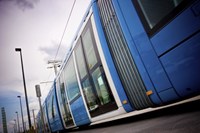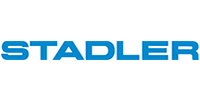
Stadler has been awarded the contract to design and manufacture 16 six-car KISS double-decker electric multiple-unit trains for Caltrain in the Unites States. The contract, with an option for an additional 96 cars, has a total value of USD 551 million. It is the first time that Stadler sells lightweight double-decker trains to the United States. With this contract Stadler KISS trains will be running in nine different countries. The contract for Caltrain marks the seventh, and by far the biggest success in the United States for Stadler.
On August 15, 2016, the contract for 16 double-decker electric multiple-unit trains (EMU) of the KISS type was signed in San Mateo, California, by Jim Hartnett, CEO of the Peninsula Corridor Joint Powers Board (Caltrain) and Peter Spuhler, Owner and Group CEO of Stadler. The contract between Caltrain and Stadler US, Inc., includes 16 six-car double-decker EMUs measuring 515 feet and 3 inches (157.1 meters) in length. The contract value amounts to USD 551 million and includes an option for 96 additional cars with a value of USD 385 million.
The new trains will connect San Francisco with San Jose in the Silicon Valley. Double-decker EMUs, with their high performance and passenger capacity, will help to provide a better service to the rapidly growing ridership by allowing Caltrain to offer faster and more frequent connections. The replacement of the existing heavy-steel-construction diesel fleet with state-of-the art lightweight aluminium EMUs will also significantly decrease greenhouse-gas and noise emissions.
Today’s contract for Caltrain marks the seventh success in the United States for Stadler: the first mark was made in 2002 with an order for 20 articulated multiple-unit trains (GTW) by New Jersey Transit’s River Line. This was followed by an order from the Capital Metropolitan Transportation Authority (CMTA) in Austin, Texas, for six diesel multiple-unit (DMU) GTWs operating between the center of Austin and Leander. The fleet was delivered in spring 2008 and extended by an additional order of four vehicles in 2015. The Denton County Transportation Authority (DCTA) commissioned Stadler to design and build 11 DMU-GTWs. These low-floor trains have served six stations in the region of Denton County, Texas, since 2012. In April 2014, the San Francisco Bay Area Rapid Transit District (BART) placed an order with Stadler for eight DMUGTWs connecting the BART Pittsburg/Bay Point end station and Antioch that will start service in 2017. Most recently, in June 2015, the Fort Worth Transportation Authority («The T») chose Stadler to design, build, and deliver eight FLIRT DMUs that will provide a new commuter rail service for the corridor between the city of Fort Worth and the northern terminus of the Dallas/Fort Worth International Airport.
At the contract signing in San Mateo, Jim Hartnett, CEO of the Peninsula Corridor Joint Powers Board (Caltrain) about the relevance of the contract: "The Caltrain Modernization Program represents the single most transformative project in Caltrain's 150-year history," said Caltrain's Executive Director Jim Hartnett. "We sought out partners that would help us deliver a world-class product that will bring Caltrain service into the 21st century. We are thrilled to be working with a company with Stadler's commitment to providing a high-performance product and the amenities that future generations of Caltrain riders will be able to enjoy."
Stadler Owner and Group CEO Peter Spuhler underscored the significance of this project: “I am very proud that we have the opportunity to build state-of-the-art double-decker trains for the United States for the first time. The KISS train is a high-tech product – perfectly suited for the Silicon Valley. The Stadler electric multiple-unit trains are weight-optimized with their proven lightweight aluminum construction. And we certainly hope to further strengthen our reputation as an innovation leader in the United States with this contract and to be successful in future tenders.”
The high-performance double-decker EMUs from Stadler are particularly attractive thanks to their proven design, low life-cycle costs, and reliability. The design of Stadler’s KISS train is fully compliant with the requirements of the «Buy America Act». With its dedicated workforce, Stadler consistently meets and exceeds the individual requirements of clients, delivering vehicles on time and on budget.
The trains meet FRA Alternative Compliance requirements for operating in mixed traffic, which results in a high level of passive safety. Specific Stadler-designed trucks have built-in air suspension to allow smooth running with exceptionally low vibration and noise levels. The standard-gauge trains have a maximum operating speed of 110 mph (177 km/h). The six-car trains are extendable to seven-car or eight-car units, providing the same swift performance with significantly increased transport capacity.
The first Stadler double-decker train in the United States will be handed over in August 2019 and will go into operation in 2020 after conditional acceptance and type testing.
The project for «The T» was the first time that the «Buy America Act» came into play in a Stadler project. The act stipulates that 60 per cent of the added value is to be created in the USA. Therefore Stadler is currently renting space in an existing manufacturing plant in Salt Lake City, Utah, for final assembly of the trains for «The T». Stadler’s commitment to its United States site and the company’s expansion is expected to create a substantial number of further jobs depending on the order intake.
About Caltrain.jpg)
Owned and operated by the Peninsula Corridor Joint Powers Board, Caltrain provides commuter rail service from San Francisco to San Jose, with limited commute service to Gilroy. Caltrain has enjoyed more than five years of consecutive monthly ridership increases, surpassing more than 60,000 average weekday riders earlier this year. While the Joint Powers Board assumed operating responsibilities for the service in 1992, the railroad celebrated 150 years of continuous passenger service in 2014. Planning for the next 150 years of Peninsula rail service, Caltrain is on pace to electrify the corridor, reduce diesel emissions by 97 percent by 2040 and add more service to more stations.
About Stadler
Stadler has been building trains for 75 years. The system provider of rail vehicle construction solutions is headquartered in Bussnang in Eastern Switzerland, and has a workforce of around 7000 based in various locations across Switzerland, Germany, Spain, Poland, Hungary, the Czech Republic, Italy, Austria, the Netherlands, Belarus, Algeria, Australia, and the United States. Stadler provides a comprehensive range of products in the commuter rail and railway segments: trams, tram trains, underground trains, regional and commuter rail trains, intercity trains, and high-speed trains. In addition, Stadler manufactures main-line dual-mode locomotives, shunting locomotives, and passenger cars, including the most powerful dieselelectric locomotive in Europe. Stadler remains the world’s leading manufacturer in the rack-and-pinion rail vehicle industry. Additionally, Stadler Service maintains 16 vehicle fleets made up of over 300 vehicles that cover a combined annual distance of 72 million kilometers.





Comments
There are no comments yet for this item
Join the discussion